
ADVOCATE: Red Tagging in the Philippines with Arlene Brosas
May 27, 2024
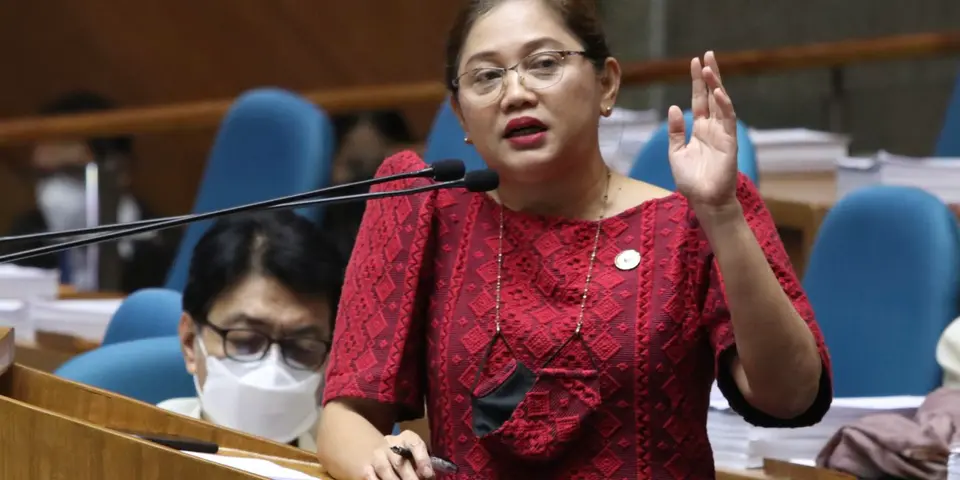
INTRODUCTION
You’re now listening to “Advocate” by APHR, ASEAN Parliamentarians for Human Rights. APHR is a network of current and former parliamentarians from Southeast Asia who use their unique position to advance human rights and democracy in the region.
Hello, I’m Karina Tehusijarana, Media Manager of APHR. I’ll be your host for today and currently I’m with Representative Arlene Brosas from the Philippines, hi Cong. Arlene.
Hi Karina, hi to the followers or to the listeners of the podcast.
Thank you Cong. Arlene.
Arlene Brosas is an educator, child rights activist, and politician. She is also an APHR Board Member and a member of the Gabriela Women’s Party-list. She is also one of the co-authors of the Sexual Orientation and Gender Identity Expression Equality Bill. Previously, as spokesperson of the Anti-Child Pornography Alliance, along with other activists and civil society organizations, she successfully lobbied for the passage of Republic Act 9775 or the Anti-Child Pornography Law that aims to protect the rights and welfare of Children.
Today we will talk with Cong. Arlene about the current political situation in the Philippines, particularly the practice of “red-tagging”, in which political activists, journalists, and others are accused of being communists, and of course the role of the Philippines’s MP and as well as Southeast Asian’s MPs in this situation.

INTERVIEW
Background
Thank you again, Cong. Arlene, for being with us today. Before we go into what the political situation is like in the Philippines, could you tell us a little bit about your background and how you first entered politics and how you joined APHR?
I entered politics in 2016. We won in the election through the women’s sector. I represent the women’s sector, which is the Gabriela Women’s Party. It is named after a famous revolutionary woman who actually fought against the colonizers during the time of 18 hundreds. So that was the background, the historical background.
Why did we enter politics? Actually, the party list was in existence since 2004, and we entered in the election in 2004 and won two seats. I came from the sector of children, actually, not in the women’s sector, but they invited me. So here I am now.
We actually espouse a nationalist kind of politics, and it’s branded as a new politics for our people. It is actually an opportunity for ordinary people to be elected through the party list system, because this is the only opportunity for the marginalized, for the underrepresented in our country, actually the poor people, to be in politics.
Usually we have political dynasties. We have the same names, we have the same people, we have the same rich and elite people in politics. But this kind of politics, the nationalist kind of politics, we are called the Makabayan bloc. So we are always in the opposition, and we are always in the minority. Not always, but most of the time, we are in the opposition.
Joined the APHR
Thank you, Cong. Arlene, how did you first learn about APHR, and why did you decide to become a member?
I was newly elected. It was in 2017 when I think it was Owen, I don’t remember his last name, in the Philippine’s parliament, who came and actually made an orientation on the works of the APHR, particularly. And he invited us and he said, the members are like Teddy Baguilat, Edcel Lagman. I was awed, and I said, yes, yes. I filled up a form, and I did. So that was the first time.
Then more came after, because I was one of the delegates, I think, of the RCEP forum in Jakarta. It was a side event on the Regional Comprehensive Economic Partnership. And I remember I first saw the members of the APHR during that time.
During that forum, I was with Congresswoman France Castro of ACT Teachers party list. At that time, we were delegates. So that was my first encounter with the workings of the APHR. And eventually I was invited to the board, which I am relatively new to, by the executive director, Jennifer. So that was my encounter with APHR.
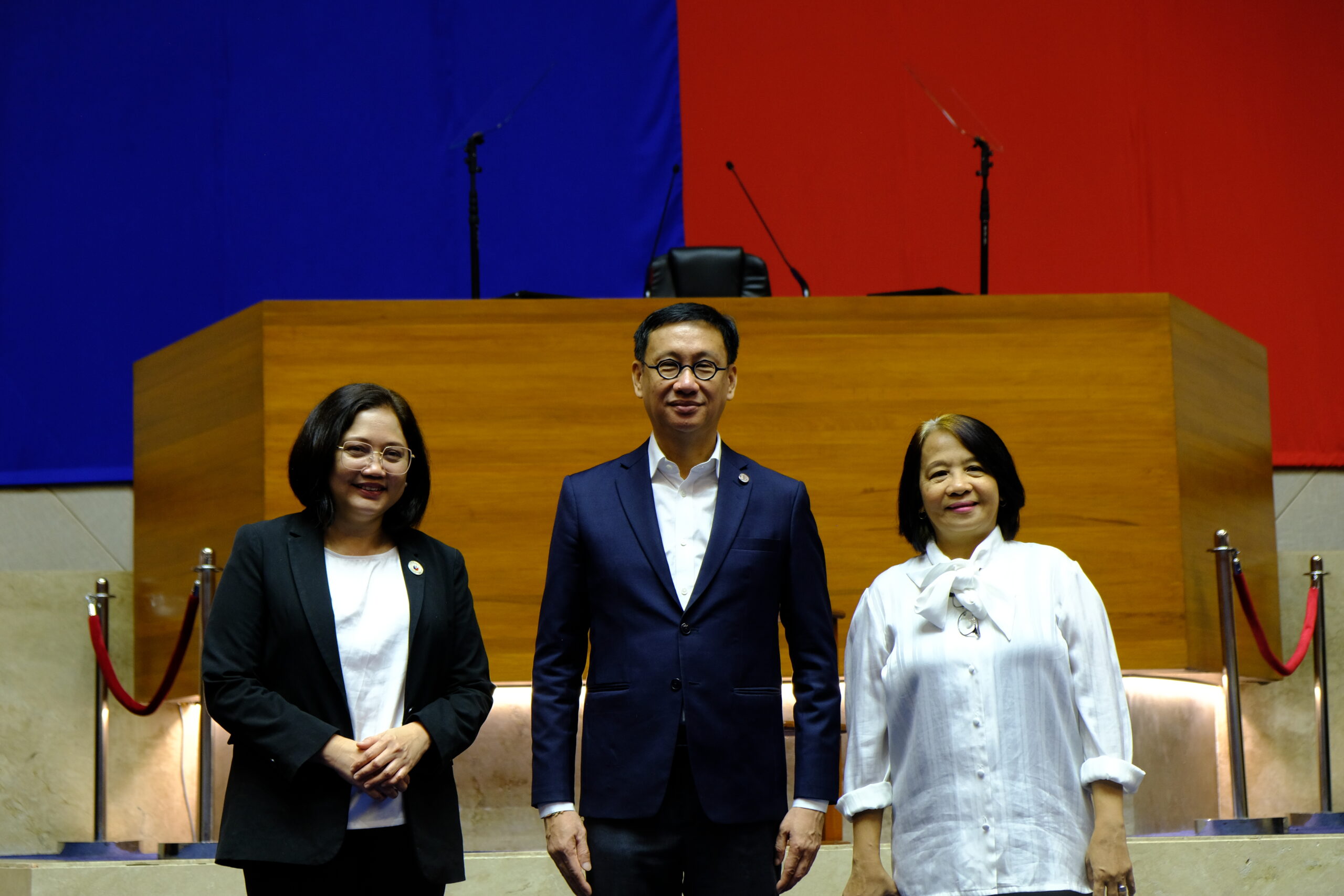
APHR Works
Thank you, Cong. Arlene. As you said, you just recently, I think, last year, joined the board of APHR, right? Can you tell us a bit about what APHR activities you’ve been involved with and particularly any of APHR’s work in the Philippines?
I learned more. No, I’m still learning until now, because being in the board, I think participating in the board is kind of a challenge for me because it’s my first time to be in a board of a human rights work, but definitely in a regional kind of set up. It is very different from the local, from our local point of view.
I am very thankful for knowing the different kinds of work of the APHR, particularly on Myanmar, on the COVID response, on the business and human rights side, on the climate change and human rights and the democracy and fundamental freedoms. I think I’ve been to some of those talks or seminars previously.
And one of the top list, I think, of what I did for APHR is to be in the delegation of the freedom of religion and belief. I was invited to Africa for the IPPFoRB, and I was invited in, I think there were two or three sessions on freedom of religion and belief that I was involved with, and, of course, the refugee and migrant rights. And those are the work of APHR that I’ve been involved with. Not all of them, of course, but some of them I’ve been with.
The Philippines’s Legislative System
Thank you, Cong. Arlene. Now, maybe we can talk a little bit about the current situation in the Philippines, but before, maybe you can explain a little bit for listeners who might not be familiar. Can you explain a little bit about the Philippines legislative system?
The Philippine legislative system is bicameral, kind of set up here in the Philippines. It is composed of the Senate and the House of Representatives. So there are two. There are 24 members of the Senate who are elected at large, while there are 316. Some of them died. So probably it’s a little. But normally it’s 316 members of the House of Representatives, of which 20% are party list representatives, of which I am a member of.
Gabriela Women’s Party is one of these elected party lists at the House of Representatives, and it remains as the sole women’s party list in Congress. So that’s how it works in the legislative system.
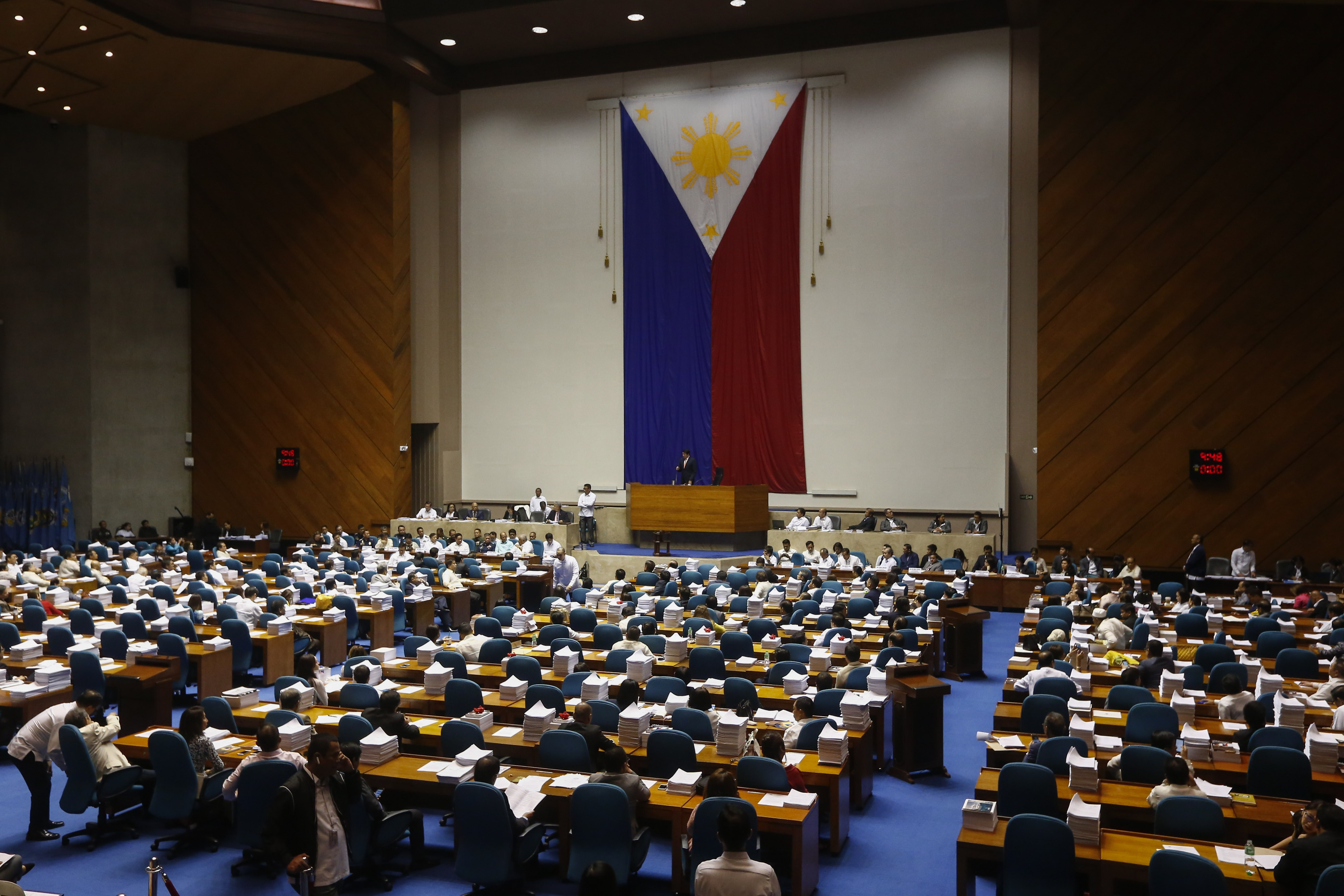
Challenges as an MP
Thank you, Cong. Arlene, as you said, you joined Congress in 2016, right? Can you tell us a little bit about what you’ve been advocating for in that time and what challenges you face as an MP?
I have actually spent more time on grassroots campaigns, and we’ve had consultations with basic sectors like the peasants, the workers, especially women workers and women, peasants and fishermen, fisher folk and urban poor dwellers, those who were demolished in their homes.
And so we take up what are the main issues or what the main advocacy of the party right now is for women and children. So we’ve had legislative discussions on those points.
And in your eight years experience in advocating for these issues, what kind of challenges have you faced in Congress?
Well, the main challenge is one key challenge, should we say the impediment at the legislative is the blurring of lines between the executive and the legislative? The chief executive’s priority. Legislative measures always get in the fast lane. What does that mean? It is at the expense of other far more important issues or measures undermining the independence of the legislative branch. I think the legislative branch can further exercise its check and balance rule and be a more active fiscalizer for reforms.
What happens is, if the president wants this to be passed, for example, the mandatory ROTC for the youth, so it will be the number one priority as opposed to the genuine agrarian reform program, supposedly of the government. So it’s like that. If you compare it, important pro people measures often get stuck or stalled at the committees, and most notably, resolutions seeking to address and investigate human rights violations in the country hardly take off. So it’s very hard.
If you know the orientation of the ASEAN Parliamentarian for Human Rights and you’ve been advocating for years on this and nothing happens. No committee inquiries were conducted on the relentless attacks on party list organizations, activists, supporters, both under and from the previous administration. So it’s very hard. But you want to be on the top of the line, to be investigated, to be, I think, to be in the mill of the legislative process. It’s not happening. So that’s the main challenge.
Best Practices
Thank you, Cong. Arlene, given these challenges that you’ve mentioned, do you have any best practices or any ideas of what the most effective entry point for, let’s say, if civil society organizations or activists want to advocate through parliament, like, where can they start?
Well, basically, in our kind of work, we actually had, we do grassroots campaigning, and we consult with the grassroots organizations, not only our organizations, of course, many organizations on the ground. We consult them. We ask them what is what, what are we supposed to put in the legislative agenda right now?
So any initiative on legal reform must begin from the ground, from the marginalized communities. They espouse the concrete demands, which can be translated to policy reform. For example, if it’s about the Magna Carta for women, the amendments on the Magna Carta of women, we check this with other organizations of women in the country.
And if we have amendments on the rape law, we ask about not only the sector of women, but of course also the health sector and other policy and advocates of these issues.
I think the most effective entry point for law reform advocacy is to really consult it with the community, with the grassroots.
Red Tagging
You know, we recently published our APHR’s annual parliamentarians at risk report in Manila last month, and one of the findings in the report for the Philippines was that Philippine MP’s, a lot of Philippine MP’s were at risk and were being red tagged, which is the practice where certain politicians or journalists or opposition figures are accused of being communists. And in 2021, your own party, Gabriela, was accused of links to communist rebels by the national task force to end local communist armed conflict, or the NTF-ELCAC. Can you explain a little bit about what happened there and if you have any updates about this case?
Until now? Until now, we are targets of this NTF-ELCAC and other cases that they made up on us, and we are still a target of red tagging. And it is still an ongoing advocacy for us to fight for our principles, for our part in this democracy.
It started actually, not in 2021, but in 2019. The NTF-ELCAC actually filed a case which accused us of links with the communist rebels. Now, the petition is to cancel the registration before the Commission on Elections, the COMELEC, and the NTF ELCAC remains alive. The case remains alive and pending, and the NTF ELCAC is still there.
Supposedly, we are about to present our side to the case at this point, however, there has yet to be a scheduled hearing. So we maintain that the case is a trumped up and fabricated case filed in time for the 2019 elections. This is my third term, in my second term, it was a challenge for me. It was in 2019. It was filed at that time. So they really wanted us to be, what do you call that? Decimated or to not be in Congress anymore. So they were hoping that in 2019, after the elections, there would be no Gabriella Women’s party in Congress. So there will be less challenge for them, for the opposition. And so that’s their purpose.
Now, filed in time for the 2019 elections, it was to spread the wrong information that we are disqualified from the party list race. We expect that the NTF-ELCAC will hype the case again as we approach the 2025 midterm elections. So that’s the final challenge.
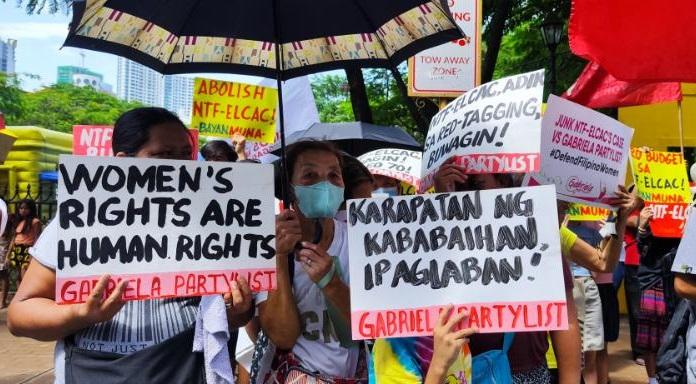
We assert that the case be junked as the supposed links to communist rebels have been disputed repeatedly in several instances. So this is not the first time that we were actually accused. And there were cases filed in COMELEC, but it was dismissed before. So they keep on rehashing. So they keep on rehashing that. So we maintain that we are a partialist organization representing marginalized women inside the parliament, advocating for pro women and pro people reforms.
Actually, our long tradition or the long track record of the women party list says it all. Because we passed so many legislations on women and children in particular, and we have been very active in participating in committees, in any debates, in any interpolations needed by the Congress. So you can just imagine if we are not there anymore in Congress, who will talk about these things.
So that’s the case. It is still alive. It is still pending. So we are still under attack. Not only the Gabriela Women’s Party list, of course, the other progressive organizations and party lists. And party lists even, for example, remember in the parliamentarians at risk launch when we actually, I hosted it.
So I know that Congresswoman France Castro still has this pending case on her, which is a criminal case, and also the case of Kabataan party list, which is also to cancel the registration of Kabataan party list. So we are being targeted right now before and even until now, up until the time that they dismissed the case. I think we can probably breathe a little, just a little. We can breathe a little if they dismiss that case, if the current administration or the current government dismisses that case.
Thank you for the overview. Cong. Arlene, can you, what kind of effects has this red tagging had on the Gabriela party list and on you yourself?
Well, of course, we’ve had a challenging time. Not only a challenging time. It was really hard in the, if it’s hard in the urban areas, it’s really very hard in the rural areas. And remember, we consult our grassroots organizations. We consult our, we call this, it’s like we form chapters like branches in the communities, in the rural areas.
It is very hard for us because people have this tendency to, “Oh, don’t join them because they are this and this and this,” so what happens is the people are afraid when supposedly we have this democracy and we have this respect for fundamental freedoms for all of us. And we abide by the civil and political rights of the people. It’s not happening on the ground.
If they have this kind of NTF ELCAC and this, I think they have the machinery to undermine us on the ground. So it was really difficult to bring in members during that time. But, you know, women have this tendency to actually dig into the matter thoroughly. So we were able to have chapters to maintain our chapters, except for those annihilated. I call it annihilation, because they are being killed. They are being incarcerated. If you are a member of the Gabriela Women’s Party, you are a target for trumped up charges.
A lot of women, we have about how many women political prisoners belonging to our party, also coming from the rural areas still until now, incarcerated women deprived of liberty. You can just imagine that.
We have been advocating for the rights of the women deprived of liberty, and they keep on filing cases on women leaders, women who are really active and participate in the community organizations, when they’ve been advocating for changes in our society, they are the ones being targeted up until now.
One example is because of the anti terrorism act that was passed recently. So, yeah, that was the effect. But we fight, we go on. And the turnout is actually, sometimes we get to have new members, but most of the time we have new members right now. And it’s good because we have this collective, I think, collective effort to really bring out the best in each and every one of the women members. So I think it’s really a no, no.
Nothing can bar us. There is no barrier for women in fighting for our own rights.
What can MPs do?
Thank you, Cong. Arlene, you mentioned the recent Anti Terrorism act, which APHR has also previously highlighted, because there’s also the tendency, besides red tagging, of terrorist tagging right where opposition figures are accused of being terrorists. What do you think that parliamentarians in the Philippines can do about the situation? And is there any mechanism or any chance that the anti terrorism law can be amended?
We are not looking actually for the amendment because we think this is a draconian law. But as parliamentarians, we are really pushing for the repeal of the antiterrorism act for being overly broad in scope and violative of the fundamental civil and political rights enshrined in our constitution. The law allows unjust arrest and detention, even without charges, and criminalizes mere association to supposed terrorists without judicial concurrence through the terrorist designation scheme by the Anti Terror Council.
So we think this anti terror council is showing terror to the people. If you’re a target. So you can be annoyed, you can be called a terrorist, and you will be terror tagged. So actually, there has been a renewed spate of antiterrorism law cases. They targeted progressives and even legitimate civil society groups.
The ATL complaints have been filed against one of our own, the secretary general of the Kabayan coalition, the nationalist coalition in which I belong to. They filed a case against Nathaniel Santiago, a longtime activist and currently our secretary general, along with three other human rights advocates. Nathanael Santiago, Anasusa San Gabriel, Rosario Brenda Gonzalez, and Servillano Luna Junior. So it keeps on filing.
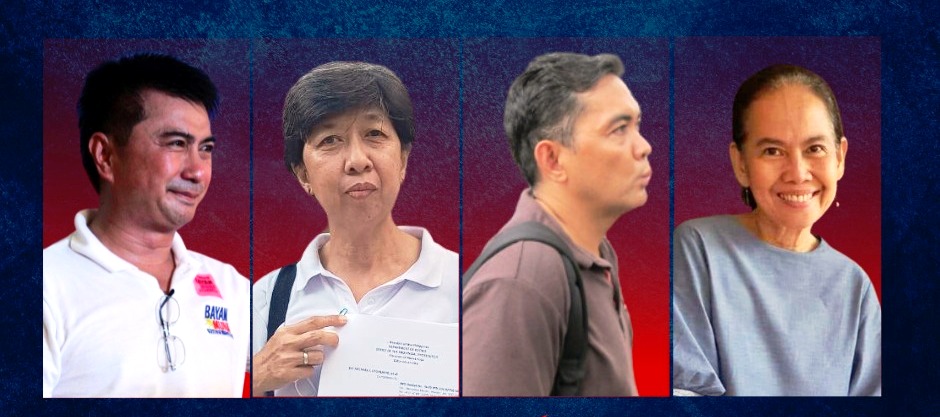
So up until the anti terror law is repealed, this will go on. So actually, no amendments will cure this. So it should be, the law should be repealed. And yeah, that’s our point. Recently, we actually accompanied the lawyers in filing the counter affidavit of these recent cases together with the secretary general of the Kabayan coalition, of the nationalist coalition. We did this in Central Luzon.
I was with Congresswoman Franz Castro at that time. She was able to speak. We actually held a rally in front of the justice hall at that time. We accompanied the counter affidavit, which is actually to dispute the ridiculous allegation that they were involved in an armed encounter. That was what, that was what was annoying.
What was in their case. Their cases were murder, international human rights violations, international human rights law violation. But the one that was physically retained was the anti terror law, the anti terror act. So they dismissed some of those, the criminal cases and the IHL, because there was no basis for it. But the anti terror losses, it was so big.
The anti terror law is so big. So it was being used, and I think it’s being weaponized by the current government to go after the critics, not only the critics of the government, those who would actually dissent. So this is really a problem for the civil and political rights of our people.
And another recent case is the terrorist designation of an award winning non government organization. So this is the trend right now. For example, the latest center fordDevelopment incorporated for supposedly making funds available to the Communist Party of the Philippines. This. It’s like a pattern.
We are alarmed that more civil society groups would be threatened to serve far flung communities on mere allegations that they are supporting communist rebels, even when government social services are scarce in those areas. So the people, since they are the ones who are there doing their humanitarian work, are more at risk right now.
All these cases affirm our call to junk the anti terrorism law for being too broad, draconian and repressive. It seriously impairs the effective functions of the political party members and organizations, and it sends a chilling effect to the democratic exercise of free speech.
So that’s about it. Karina. So overall, with the cases to individuals, the organizations, so they actually disrupt the people’s rights to do humanitarian work per se.
How to Repeal the Anti Terrorism Law
Thank you for telling us about those cases Cong. Arlene, can I ask, how does, how would a repeal of the anti terrorism law work? How many votes would be needed in Congress to get that?
First of all, it has to go through the regular process, which is to have committee hearings, and it depends on the committee chair how many hearings are issued for that. And it has to go to the first reading in Congress. You have to file the repeal. And we filed it. Actually, it’s been done.
The second process is the hearing. And after the committee hearing, if they agree to repeal the law, it will be in the plenary, which is open for debates. It is up for third reading to approve it by the 316 members of the Congress. So the majority, we have to take the majority. If it’s in the majority, then you win. If it’s not, then you lose. Then it goes to the Senate.
In the Senate, they have the three processes again, the first, second reading and third reading. Then it goes to the president, which he’s supposed to sign it. After that, it will be repealed. So that’s the process. So it’ll take a long time. So what we are banking on right now is the people who are experiencing this repressive law.
There should be a lot of clamor from the people, from the people on the ground to make changes on this certain measure. So we are hoping that since the cases are piling up and there are so many, so much happening on the ground, we are hoping that it will make some noise in putting it in the agenda of the current administration.
What can we do?
What do you think that the general public and civil society can do to help push for the repeal of repressive laws such as the Anti Terrorism act?
So there should be lots of campaigns, lots of community organizations participating in this campaign advocacy to actually act on the matter. Because on the ground, it is annoying. Since it’s a repressive law, it’s not that popular. It’s not about economics. It’s about the issue of rise. It’s more popular. This is kind of about politics. So it’s very hard for people to digest the issue up until, unless it happens to them.
So sometimes those who can understand this are the progressive, the activists, those who are in parliament, those who are concerned about this kind of issue.
Pull-quotes:
So what to do now is to actually disseminate information about this and do a lot of groundwork, grounding us in consultations and other things that we should do rallies and especially in the rural areas. We’re at that point to explain everything about this repressive law and draconian law.
Regional Solidarity
Thank you. This will be the last question for the podcast. As you know, it’s the last one. As you know, APHR was founded with the idea of creating regional solidarity among parliamentarians in Southeast Asia. What do you think the role of Southeast Asian MP’s are like? What can Southeast Asian MP’s do to help improve the human rights situation in the Philippines as well as in other countries in Southeast Asia?
Yes, I think the primary role of the APHR members, since it’s a regional network, we should advance human rights and democracy in Southeast Asia. So that’s the main point, I think that’s the main point. We should help each other create more opportunities for us to discuss, to have consultations on the current situations, conditions of different countries in Southeast Asia.
So the more that we talk about what’s happening, the violence, the discrimination, even the development in those areas, in those countries, in other countries, we should discuss about it and advocate for human rights in other countries, also in the Southeast Asia particular, by recognizing the human rights issues in the connection of the human rights issues in each and every country that we have in APHR, I think it will be more productive for us and will have a framework, and there will be no borders in protecting and promoting human rights through the APHR.
Thank you very much, Cong. Arlene, and thank you very much much for taking the time to be with us on this podcast.
Thank you, Karina. Thank you. In Filipino, it’s Maraming Salamat.
CLOSING
That was an episode of ADVOCATE by APHR, ASEAN Parliamentarians for Human Rights. Drop your ideas for any podcast topics or any interview subjects for this podcast through [email protected] that’s [email protected] and also let us know what your thoughts are on this episode. Before we sign off, I would like to thank you for your support and thanks for tuning in. I’m Karina Tehusijarana. See you soon.
ASEAN Parliamentarians for Human Rights (APHR) was founded in June 2013 with the objective of promoting democracy and human rights across Southeast Asia. Our founding members include many of the region's most progressive Members of Parliament (MPs), with a proven track record of human rights advocacy work.